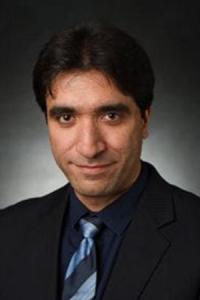11:00 AM
12:30 PM
“Going beyond classical computers"
2024 Ashtekar Frontiers of Science
Exploring Scientific Progress Over Time

Classical computers based on semiconductor technology have revolutionized our daily lives in many aspects: from smartphones and portable laptops to tiny medical sensors and healthcare devices. The main driving force behind what we now know as the semiconductor revolution was the urge to create smaller, faster, and more power devices. From the industry point of view, this urge was summarized in Moore’s law – named after Gordon Earle Moore, one of the co-founders of Intel. Moore’s law states that the number of transistors in an integrated circuit doubles about every two years. However, as we are approaching nanometer-sized devices — devices that are hundred thousand times smaller than a strand of hair — Moore’s law is struggling to keep up. In this talk, Kayyalha will introduce an emerging technology based on quantum mechanics that could go beyond semiconductor-based classical computers. He will discuss why there is a need for such a technology, how this technology works, and how it could impact our daily lives and society as a whole.
Morteza Kayyalha, assistant professor of electrical engineering, runs the Quantum Devices Lab (QDL) at Penn State. QDL is a multi-disciplinary lab focusing on electrical, thermoelectric, and superconducting properties of quantum materials. His mission is to make novel devices to harness the exotic properties of the quantum materials for applications in the future quantum technologies. Kayyalha earned a doctoral degree in the Department of Electrical and Computer Engineering at Purdue University in 2018 and was a postdoctoral researcher in physics at Penn State from 2018 to 2020.
Nitin Samarth

Nitin Samarth, Verne M. Willaman Professor of Physics and professor of materials science and engineering, is an internationally recognized condensed matter experimentalist known for his leading contributions to understanding spin-dependent physical phenomena in quantum materials. He has developed diverse new families of materials platforms using a technique called molecular beam epitaxy. This work led to the birth of two major fields of study: semiconductor quantum spintronics and topological spintronics. Samarth has played a key role in the materials community at Penn State and beyond as a co-PI and associate director of the 2D Crystal Consortium, an NSF-funded national user facility that works to advance the frontiers of two-dimensional quantum materials. Samarth is an elected Fellow of the American Association for the Advancement of Science and the American Physical Society. His awards and honors include the Distinguished Alumnus Award from the Indian Institute of Technology, Bombay, in 2019, an Outstanding Physics Alumni Award from Purdue University in 2008, a Faculty Scholar Medal in the Physical Sciences from Penn State in 2008, a George W. Atherton Award for Excellence in Teaching from Penn State in 2007, and a Society of Physics Students Annual Award for Excellence in Physics Teaching from Penn State in 1993. Samarth has held leadership roles in the American Physical Society (APS), including on the Chair-line of the Division of Materials Physics from 2017 to 2021 and currently on the Chair-line of the APS March Meeting. Prior to joining the Penn State faculty in 1992, Samarth was a faculty fellow in the physics department at the University of Notre Dame. He earned a doctoral degree in physics at Purdue University in 1986 and an undergraduate degree in physics at the Indian Institute of Technology in Bombay, India, in 1980.
